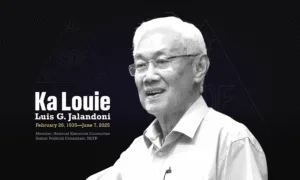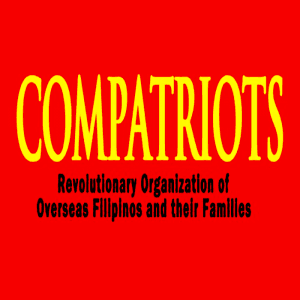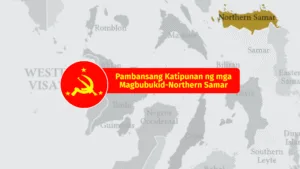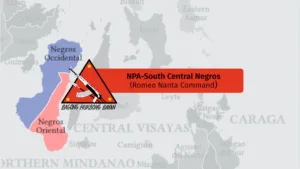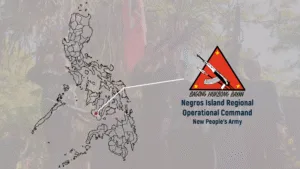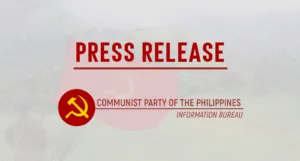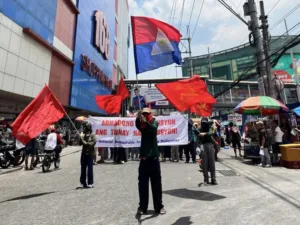THE PEOPLE’S CHALLENGE: DUTERTE’S VICTORY MUST BRING ABOUT SHORT TERM AND LONG TERM OPPORTUNITIES FOR MINDANAO AND THE WHOLE NATION
[Bisaya »]
The just concluded reactionary elections, as expected, have all the markings in form and essence attendant to a true bourgeois election. Overwhelmingly, the candidates came from the landlord and comprador bourgeoisie classes and bureaucrat capitalists, and almost none of them came from the working classes save for a few truly marginalized representatives from the elite dominated partylist system. There is also a preponderance of political dynasties nationwide while the masses are simply excluded from real political power.
Thus the more basic people’s issues were seldom discussed in the presidential debates and campaign platforms of the national and local parties and candidates including the issues of genuine land reform and national industrialization; the intensifying militarization and rampant violation of human rights; environmental issues specifically on the destructive effects of imperialist mining and plantations; and others. The agenda on the defense of our sovereignty focusing on the Chinese incursion in our territory again evaded the more glaring US military occupation of various military camps nationwide. Vote buying and election overspending were rampant using government funds as well as “contributions” from big business and foreign patrons. As in the two previous elections, there were reported irregularities in the use of manipulated automated election machines. There is a strong perception that the US is influencing the result of the national election. The military also unduly and actively influences the outcome of the election, especially among the militarized areas in Mindanao.
The recent bourgeois election allegedly participated in by more than 80 % of the registered voters nationwide is not a genuine exercise of democracy of the broad masses but simply a way to “amicably” select from who among the ruling classes will be the next bureaucrat in power. The majority of the poor and exploited were just enticed to participate in the political circus to legitimize bourgeois election as a democratic exercise, but the broad masses can never expect much from the recent bourgeois electoral process.
However, the election to the presidency of Mayor Rodrigo Roa Duterte, “Digong” to the masses, opens opportunities for the people’s demands and aspiration in Mindanao. The overwhelming votes from Mindanao estimated at almost 70% for Duterte indicates the people’s ire against the dreaded Oplan Bayanihan as well as the deceptive “daang matuwid” of the US-Aquino III regime. Aside from being a Mindanaon himself, presumptive President Duterte in many instances in the past stood on the side of the people, in such issues as forced evacuation, US intervention in Davao City, human rights violations, the defence of the urban poor, environmental issues, illegal drugs, the release of Prisoners of War (POW) and others. The presidential power places him in a better position to be more effective in defending the people’s interest if he so decides to stand by the people in the face of pressures from the whole ruling classes, the military and US imperialism.
Particularly in Mindanao, the immediate challenge to “Digong’s” “pro-masa” leadership is how to immediately stop the militarization of Mindanao to normalize the economic, social and cultural life of the Lumad, Moro and the non-Moro people; the safe and immediate return of the thousands of victims of forced evacuation to their homes in Davao region, Caraga region, Bukidnon, North Cotabato, in Moro areas and other parts of Mindanao; the immediate re-opening of schools forcibly closed and putting a stop to the harassment of schools; the end to extra-judicial killings and other forms of human rights violation perpetrated by the military and paramilitary units organized by the AFP alongside the delivery of justice to all the victims; the immediate disbandment of the para-military forces; an end to the rampant proliferation of drug syndicates in the rest of Mindanao; immediate food aid to the peasant masses affected by the prolonged drought; the release of political prisoners, especially the many innocent civilians detained or sentenced on the basis of trumped-up cases, and other such issues.
On the other hand, these challenging tasks must be complimented by the people’s broadest movement in Mindanao approaching President-elect Duterte to hasten the realization of these immediate people’s concern in Mindanao, giving counter-weight in the face of reactionary counter pressures to the new president.
On top of these immediate Mindanao people’s concern and the other immediate national concerns–such as the persistent LRT and traffic problems, the illegal drug problem, criminality and others–, are the urgent, long term and basic issues that concern not only the people of Mindanao but also the Filipino people as a whole. The concern for lasting peace based on social justice is a national priority concern, in fact even more urgent in the war torn Moro areas and militarized NPA regions in Mindanao. Thus the call for the immediate resumption of the stalled peace talks between the Government of the Philippines and the National Democratic Front of the Philippines is a major challenge to the new president. The immediate release of the NDFP peace negotiation consultants and other political prisoners nationwide as a good-will measure will definitely hastens the resumption of the peace talks.
The most basic concern of the majority of the Filipinos, the workers and the peasants, is the implementation of the genuine land reform and national industrialization and must be the top agenda of the new government. The realization of this priority may not be achieved within the six-year term of the new government but the direction towards this end will be most welcome to the common people who voted for “Digong”. Our national patrimony must be protected vis-à-vis the continuing in-road of imperialist economic interests and the attempt to amend the bourgeois constitution to allow them 100% ownership of land and business corporations in our country.
The neo-liberal policies of the previous regimes on our economy, education, health system and infrastructure must be reversed in favor of our national interest. The new president must pursue an independent foreign policy that makes clear that the handling of the Chinese incursion in our territory is conducted with the highest national interest at stake and not influenced by the US-imperialist hegemonic ambitions in the region. The new government must abrogate the onerous Enhanced Defense Cooperation Agreement and other previous agreements with the US and must defend our sovereignty against expanding US troop deployments in our three major islands.
The broadest possible nationwide mass movement for national liberation and democracy must make an impact on the new government to countervail the inherent reactionary character of any regime under the semi-feudal and semi-colonial Philippine society.
Ka Oris
NDF Mindanao
13 May 2016
“HAGIT SA KATAWHAN: ANG KADAUGAN NI DUTERTE KINAHANGLAN MAGDALA SA HINANALI UG LAHUTAY NGA KAHIGAYONAN ALANG SA MINDANAO UG SA TIBUOK NASUD
Ang bag-o pa lang natapos nga reaksyonaryong election, sumala sa gidahom, nagpakita sa porma ug esensya sa usa ka burges nga eleksyon. Daku kaayong mayoriya sa mga kandidato naggikan sa mga hut-ong sa agalong yutaan ug burgesya ug mga burukrata kapitalista, ug halos walay gikan sa mga mag-uuma ug mamumuo, gawas sa pipila nga tinuod nga kabus nga representante gikan sa dominado sa nagharing hut-ong nga sistema sa partylist. Nagpatigbabaw usab ang dinastiya sa pulitika sa tibuok nasud samtang ang halapad nga katawhan walay kahigayonan sa tinuod nga gahum sa pulitika.
Busa ang mas batakan nga isyu sa katawhan halos wala mahisguti sa mga debate sa kandidato pagka-presidente ug diha sa mga plataporma sa kampanya sa mga nasudnon ug ug local nga mga partido ug kandidato sama sa isyu sa tinuod nga reporma sa yuta ug nasudnong industriyalisasyon; ang nagkakusog nga militarisasyon ug kaylap nga kalapasan sa tawhanong katungod; kadaut sa kinaiyahan particular sa kadaut nga gidulot sa mga imperyalistang minahan ug plantasyon; ug uban pa. Nagpokus ang hisgutanan kalabot sa atong soberenya batok sa pag-okupar sa Tsina sa atong teritoryo apan naglikay sa paghisgot sa mas tin-aw nga okupasyon sa tropa sa US sa nagkalain-laing kampo militar sa tibuok nasud. Ang pamalit sa boto ug subrang gastos sa eleksyon ginamit ang pundo sa gobyerno ug amot gikan sa dagkung negosyo ug langyaw nga tigsuporta. Sama sa miaging duha ka eleksyon, daghan ang reklamo sa panglimbong pinaagi sa pagmanipula sa automatic nga makina sa eleksyon. Dunay kusog nga pagtuo nga nanghilabot ang US sa nasudnong eleksyon. Ang militar aktibo usab nga naga-impluwensya sa mahimong resulta sa eleksyon, ilabi na sa mga militarisadong erya sa Mindanao.
Ang pinaka-ulahing burgis nga eleksyon nga giingong gisalmutan sa kapin sa 80% sa rehistradong botante sa tibuok nasud dili usa ka tinuod nga ehersisyo sa demokrasya sa halapad nga katawhan kun di usa lang ka pamaagi aron “malinawong” pili-on kun kinsa gikan sa mga nagharing hut-ong ang mosunod nga mga burukrata nga motuntong sa gahum. Ang mayoriya sa katawhang kabus ug pinahimuslan igo lang gidani nga mosalmot sa pulitikanhong sirkus aron himoong lihitimo ang burgis nga eleksyon isip usa ka demokratikong ehersisyo, apan ang halapad nga katawhan dili makalaum og daku gikan sa pinakaulahing burgis nga proseso sa eleksyon.
Hinoon, ang pagkapili sa pagka-presidente ni Mayor Rodrigo Duterte, “Digong” sa mga masa, nagbukas sa oportunidad alang sa mga demanda ug pangandoy sa katawhan sa Mindanao. Ang daku kaayo nga boto gikan sa Mindanao nga gibanabana nga dul-an 70% para kang Duterte nagpakita sa kasuko sa katawhan batok sa bangis nga oplan Bayanihan ug malinglahong “daang matuwid” sa rehimeng US-Aquino III. Gawas nga taga-Mindanao siya, ang napiling presidente sa daghang higayon sa nangagi mibarug para sa katawhan sa mga isyu sama sa pugos nga pagbakwit, interbensyon sa US sa Davao City, kalapasan sa tawhanong katungod, pagpanalipod sa mga kabus sa syudad, mga isyu sa kinaiyahan, iligal nga druga, pag-release sa mga Prisoners of War (POW) ug uban pa. Ang gahum sa usa ka presidente magbutang kaniya sa epektibong posisyon aron panalipdan ang interes sa katawhan kung mohukom siya nga mobarug para sa katawhan taliwala sa presyur gikan sa tibuok nagharing hut-ong, militar ug imperyalista.
Partikular sa Mindanao, ang hinanaling hagit sa “maki-masa” nga liderato ni “Digong” mao kung unsaon nga maundang ang militarisasyon sa Mindanao aron ma-normalisa ang pang-ekonomiya, sosyal ug kultural nga kinabuhi sa katawhang Lumad, Moro ug dili-Moro; ang luwas ug hinanali nga pagpauli ngadto sa ilang panimalay sa mga linibong biktima sa pugos nga pagbakwit sa Davao region, Caraga region, Bukidnon, North Cotabato, mga lugar sa Moro ug ubang lugar sa Mindanao; ang hinanaling pag-abli sa mga eskwelahan nga pugos nga gipangtak-opan ug pag-undang sa mga harassment sa mga eskwelahan; pag-undang sa “extra-judicial killings” ug ubang porma sa kalapasan sa tawhanong katungod nga hinimoan sa mga militar ug para-militar nga gitukod sa AFP, ug paghatag sa hustisya sa mga biktima; hinanaling pagbungkag sa mga para-militar; pag-undang sa nagkatap nga sindikato sa ginadili nga druga; hinanaling hinabang sa pagkaon sa mga apektado sa hataas nga hulaw; ang pag-release sa mga pulitikanhong binilanggo, ilabi na kadtong mga sibilyan nga nabilanggo ug sentensyado pinasikad sa mga tinumo-tumo nga kaso, ug uban pang mga isyu.
Sa pikas nga bahin, kini nga mahagitong tahas kinahanglang masuportahan sa pinakapalad nga kalihokan sa katawhan sa Mindanao nga mag-awhag sa bag-ong presidente nga himoong hinanali ang pagkab-ot niining mga hinanaling pangayo sa katawhan sa Mindanao aron mo-alkontra sa kusog nga reaksyonaryong presyur ngadto sa bag-ong presidente.
Ibabaw niining mga hinanali nga pangayo sa katawhan sa Mindanao ug sa mga hinanaling tagdon sa nasudnong langkob — sama sa LRT ug problema sa trapik, iligal nga druga, kriminalidad ug uban pa –, mao ang mas mahinungdanon ug batakang mga isyu nga dili lang interes sa katawhan sa Mindanao kundi sa katawhang Pilipino sa kinatibuk-an. Ang isyu sa malahutayong kalinaw pinasikad sa katilingbanong hustisya usa ka nasudnong prioridad, nga mas hinanali sa mga gubot nga lugar sa Moro ug sa militarisadong mga rehiyon sa NPA. Busa, ang panawagan alang sa hinanaling pagbalik sa negosasyon alang sa kalinaw usa ka mayor nga hagit sa bag-ong presidente. Ang hinanaling pag-release sa mga NDFP konsultant sa peace talks ug ubang mga pulitikanhong binilanggo sa tibuok nasud usa ka pagpakita sa maayong kabubut-on nga seguradong magpapaspas sa pagbalik sa negosasyon alang sa kalinaw.
Ang pinakabatakang pangayo sa mayoriyang Pilipino, mamumuo ug mag-uuma, mao ang implementasyon sa tinuod nga reporma sa yuta ug nasudnong industriyalisasyon nga nag-unang kinahanglang tagdon sa bag-ong gobyerno . Ang pagtagad niini nga prioridad mahimong dili makab-ot sulod sa unom ka tuig nga termino sa bag-ong gobyerno apan ang maong direksyon alang niini maoy labing gipaabot sa halapad nga katawhan nga miboto kang “Digong”.
Ang neo-liberal nga mga palisiya sa miaging mga rehimen sa atong ekonomiya, edukasyon, sistemang panglawas, ug impra-istruktura kinahanglang usbon pabor sa nasudnong interes. Kinahanglang subayon sa bag-ong presidente ang independenteng langyawng palisiya kalambigit sa paglapas sa Tsina sa atong teritoryo ug ipasikad sa kinatas-an interes sa nasud ang pagtagad niini ug dili magpa-impluwensya sa ambisyon sa US nga maghari sa rehiyon.
Ang pinakalapad nga posible nga kalihokang masa alang sa nasudnong kalingkawasan ug demokrasya kinahanglang mo-impluwensya sa bag-ong gobyerno aron pag-alkontra sa batakang reaksyonaryong kinaiya sa semi-pyudal ug semi-kolonyal nga katilingbang Pilipino.
K.O.
13 May 2016

